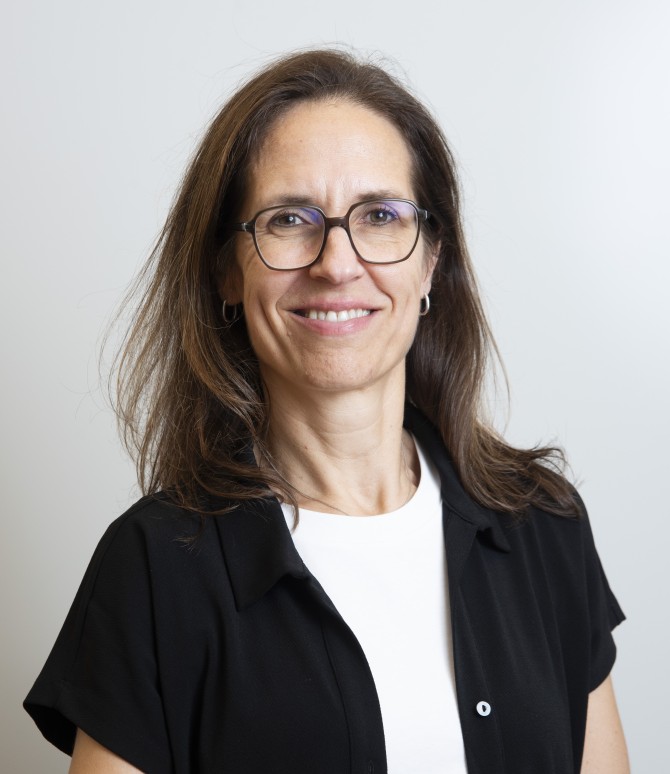Engineering Innovations in Medicine, an initiative launched by Cornell Engineering and Weill Cornell Medicine in 2022 to transform human health through data-driven innovation and interdisciplinary collaboration, will now be led by Claudia Fischbach-Teschl as part of her portfolio as James M. and Marsha McCormick Family Director of the Meinig School of Biomedical Engineering.
Claudia Fischbach-Teschl, the James M. and Marsha McCormick Family Director of the Meinig School of Biomedical Engineering, leads the Engineering Innovations in Medicine initiative at Cornell.
"Engineering Innovations in Medicine leverages Cornell's strengths in engineering, data science, and medicine to develop precision tools for data acquisition, from imaging and omics to microphysiological systems and monitoring devices," said Lynden Archer, the Joseph Silbert Dean of Engineering. "When integrated with AI-driven frameworks and computational architectures, these innovations accelerate therapeutic development, improve disease prediction, and transform health care."
In his announcement of changes to the initiative, Archer thanked Emmanuel Giannelis, who recently became the college's associate dean for innovation and also serves as the Walter R. Read Professor of Engineering in the Department of Materials Science and Engineering, for leading the initiative during its first three years.
Among other strides, the initiative has piloted an M.D.-M.Eng. program and created an M.Eng. pathway in health systems with Weill Cornell Medicine. It also established the Professor William Maxwell '56 Fellows, funded by a gift from Dev Joneja, Ph.D. '89, to support research that uses artificial intelligence and other advances in data science for applications such as disease detection, drug development, predictive health care, and clinical decision support.
"Claudia has a long history of cross-department and cross-campus collaborations, making her the perfect person to build on the early success of this important effort," Archer said. "Under her leadership, Engineering Innovations in Medicine will continue to have a broad reach, combining established programs with emerging initiatives to make meaningful difference in a range of health outcomes."
Fischbach-Teschl, who is also the Stanley Bryer 1946 Professor of Biomedical Engineering, previously served as director of Cornell's intercampus Physical Sciences Oncology Center on the Physics of Cancer Metabolism and as associate director of Cornell Nanoscale Science and Engineering Facility. She received her Ph.D. in pharmaceutical technology from the University of Regensburg, Germany, and conducted her postdoctoral work at Harvard University in the Division of Engineering and Applied Sciences. She is a fellow of the American Institute for Medical and Biological Engineering, the Biomedical Engineering Society, and the Alexander von Humboldt Foundation in Germany.
"To truly advance something as complex as human health, we must weave together many different forms of expertise," Fischbach-Teschl said. "Cornell's collaborative spirit has shown time and again that when engineers, clinicians and life scientists unite, they don't just solve problems, they redefine what is possible in health care. Engineering Innovations in Medicine is bringing established strengths and emerging opportunities under one bold umbrella, serving as a launchpad for transformative breakthroughs and empowering students to reimagine how medicine is discovered, delivered and imagined."
To advance the initiative's overall goal of redefining medicine by applying cutting-edge engineering principles to acquire, compute and use data, Fischbach-Teschl plans for the next phase of Engineering Innovations in Medicine to be initially built around four pillars rooted in Cornell Engineering.
Two of these pillars are well-established programs. One is the Center for Data Science for Enterprise and Society led by David Shmoys, the Laibe/Acheson Professor of Business Management and Leadership Studies in the School of Operations Research and Information Engineering. The other is Cornell Neurotech-Engineering, led by Mong Family Foundation Director Chris Xu, who serves as IBM Professor of Engineering and director of the School of Applied and Engineering Physics.
The other two nascent pillars include a new Menopause Health Engineering initiative led by Nozomi Nishimura, associate professor in the Meinig School, and an initiative to enhance medical data acquisition, computation and analysis for cancer co-led by Iwijn De Vlaminck, associate professor in the Meinig School, and Olivier Elemento, director of the Englander Institute for Precision Medicine at Weill Cornell Medicine.
In addition to pushing boundaries in research, the initiative will prioritize experiential learning opportunities to equip both undergraduate and graduate students with interdisciplinary expertise at the intersection of engineering, computation, and medicine.
De Vlaminck, who has a track record of collaborations with Weill Cornell Medicine and leadership in developing technologies that advance precision medicine, will also serve as the associate director of Engineering Innovations in Medicine.
"I look forward to all that this team accomplishes under Claudia's leadership," Archer said. "Engineering Innovations in Medicine is a tremendous example of the positive, tangible difference we, as engineers, can make in people's lives when we apply our expertise to the world's pressing problems."







